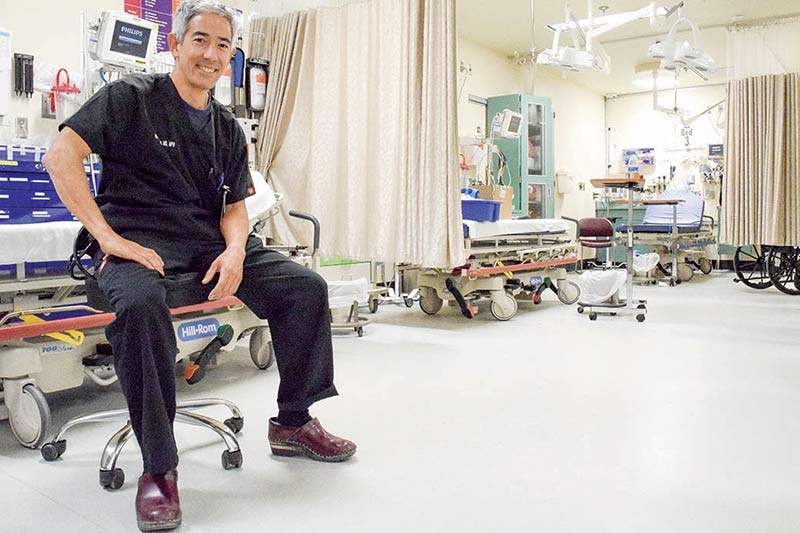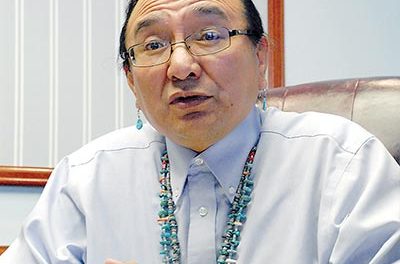
Doctors without Borders volunteer: Tuba in good shape health-wise compared to Africa

Navajo Times | Krista Allen Dr. Edward Chu, an emergency medicine physician at Tuba City Regional Health Care Corporation, sits inside the ER. Chu completed a mission in the Central African Republic with Doctors Without Borders, an international medical humanitarian organization.

Navajo Times | Krista Allen
Dr. Edward Chu, an emergency medicine physician at Tuba City Regional Health Care Corporation, sits inside the ER. Chu completed a mission in the Central African Republic with Doctors Without
Borders, an international medical humanitarian organization.
TUBA CITY
While working at a Doctors Without Borders trauma hospital in the Central African Republic, Dr. Edward Chu saw a lot of things he sees in the emergency room at Tuba City Regional Health Care Corporation.
“Road traffic accidents, stabbings,” Chu explained, “and some things we don’t see here, like grenade injuries.”
Chu, an emergency medicine specialist at TCRHCC, recently returned to the Navajo Nation after working for six months with Doctors Without Borders in the republic, a landlocked country mired in civil war and the legacy of colonization.
“But there are a lot of things that are very similar to the kind of conditions that we see,” Chu said.
Chu says he saw a lot more trauma there than he has seen in Tuba City.
“The Central African Republic is a country still in conflict so the gunshot wounds, the stabbings are more frequent,” he explained.
And that experience, he says, translates very directly to when he sees a Tuba City ER patient who has similar injuries.
“Also, there, we had fewer resources,” Chu said. “We had X-ray but no CT scan. And I did a lot – a lot of ultrasound, which is something we use a lot in the ER, but there I was using it all the time.”
Doctors Without Borders (Médecins Sans Frontières in French) is a nonprofit international medical humanitarian organization that helps people worldwide where the need is greatest. Typical postings for physicians are from six to 12 months.
“That can be from natural disasters such as the earthquake in Nepal or it can be in wars,” explained Chu, who began work with Doctors Without Borders in November 2016. “Right now there’s projects in Yemen (where there is a cholera outbreak) and in Iraq (where Iraqi forces recently declared victory over Islamic State in Mosul, but fighting continues).
“The project that I just came back from is in CAR, a country that has been in conflict for many, many, many years,” he continued. “But the most recent conflict there was in 2013.”
Doctors Without Borders runs activities in 17 locations focusing on malaria, vaccinations, and maternal and child health. The organization also provides assistance to refugees in the neighboring countries of Chad, Cameroon, and Democratic Republic of Congo.
The republic faces a chronic and prolonged health emergency, according to Doctors Without Borders. The political crisis that led to a violent conflict in 2013 has still not been resolved and has exacerbated a preexisting humanitarian and health emergency.
Doctors Without Borders and other non-governmental organizations provide the majority of the health services but their work is repeatedly obstructed by armed groups and organized crime.
To read the full article, pick up your copy of the Navajo Times at your nearest newsstand Thursday mornings!
Are you a digital subscriber? Read the most recent three weeks of stories by logging in to your online account.







 Highway 264,
Highway 264, I-40, WB @ Winslow
I-40, WB @ Winslow